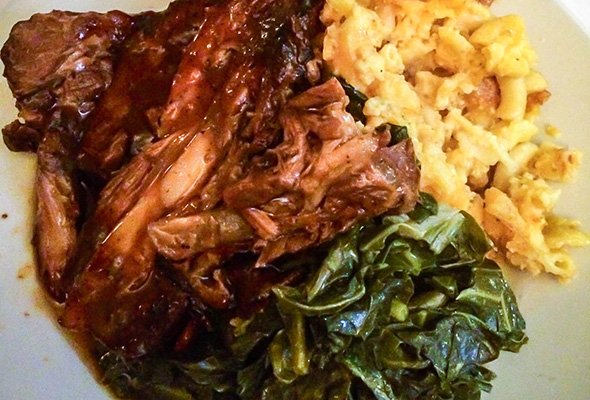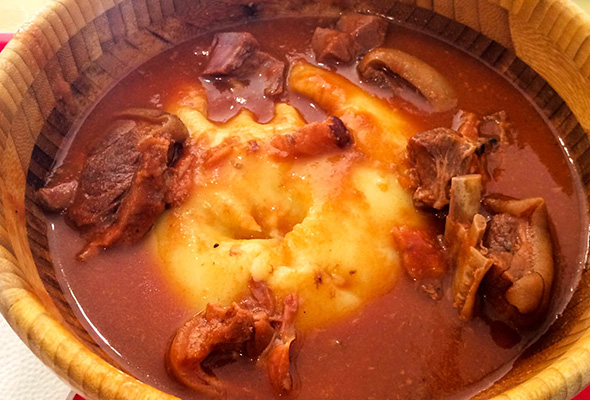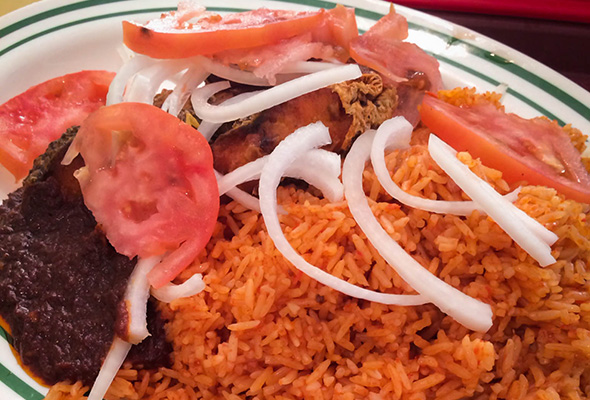By Johanna Barr
When Sam Amoah first came to New York in 1982, at age 24, he had trouble finding fellow immigrants from his native Ghana.
“I used to look around, like, where could I find Ghanaians?” said Amoah, a large man with a broad smile and a newsboy cap. “I was the only one here.”
Amoah started working as a prep cook in restaurants, first in Manhattan and then in Florida and Connecticut, before deciding he wanted to open a place of his own. He eventually returned to New York and settled in the Bronx, where a growing community of Ghanaians had begun to take shape.
Today, Ghanaians make up the largest group of African immigrants in New York City. Of the 23,000 who live here, nearly 17,000 reside in the Bronx, according to 2010 Census data.
“It’s too much now,” Amoah said, laughing. “Before, I was looking for Ghanaians. Now, we’re everywhere. Especially here in the Bronx.”
Amoah opened Sam’s Soul Food, on Grand Concourse between 150th and 151st streets, in 1998. He was the first African immigrant to open a business on the Concourse, the major thoroughfare that stretches up and down the borough’s west side.
He serves what he refers to as comfort food – mostly Southern-style barbecue, with some Caribbean flavors — to a dedicated army of regulars, a mix of Africans and African-Americans.
There aren’t any traditional Ghanaian dishes on Amoah’s menu, but he sees plenty of overlap between his native cuisine and what he serves.
“Soul food, to me, it’s something that came from Africa,” he said. “Like the collard greens – we have similar greens. Macaroni and cheese. The yams. All these things are from the South, but most people in the South are from Africa.”
His younger brother, David, who followed Sam to the United States, works as a chef at the restaurant. David thinks Ghanaian cuisine and soul food are remarkably similar – in all ways except one.
“The main difference is, back home, the food is spicy. But a lot of people don’t eat spicy out here,” he said. “If you want it spicy, you have to put your own spices in there to get it the way you want it.”
The best way to do that is with shito, a Ghanaian hot sauce that comes in two varieties: red, made with fresh tomatoes, and black, fishy and intense. There’s Mexican hot sauce on the tables at Sam’s, but shito is available if you ask for it. Amoah buys the black kind at an African market a few blocks away and keeps it in the kitchen for those in the know.
Recently, more markets and restaurants have opened up and down the Concourse to cater to the growing Ghanaian community. Many of them serve more traditional food than Sam’s, including Papaye, one of the most popular and authentic Ghanaian restaurants in the Bronx. It has two locations, the newer of which is on 183rd Street, near Fordham University.
Some people speak English at Papaye, but most of the conversations you hear are in the Ghanaian language of Twi. There are a few pieces of African art on the walls and a flat screen TV that’s usually tuned to soccer. Toward the back, there’s a stand-alone sink, so customers can wash up before they eat. They’ll need to, since they’ll probably be using their hands throughout the meal.
The centerpiece of the menu is fufu, a thick, pasty dough made of cassava and plantain. Most of the soups and stews on the menu come in wide, shallow bowls, with a large ball of fufu in the center. The proper way to eat it is to pinch off a small amount of fufu and use it to scoop up the soup.
The customers are such experts that they don’t have to look down at their bowls as they eat. Their eyes remain trained on the TV, as they watch the game intently.
Another staple is jollof rice, spicy, orange-red and cooked with tomatoes, and served with chicken or fish. There’s a spinach stew called palaver sauce, and yams and plantains are available on the side. Nearly everyone orders waakye, a Ghanaian version of rice and beans.
But fufu is the star of the show. It’s bland on its own, all the better to absorb the characteristics of whichever liquid it’s floating in, from a thin, peanut-based soup, to a tangy, peppery dish known as light soup. One day at Papaye, light soup was served with tender, braised goat meat, a favored protein in Ghanaian cuisine.
There’s no goat meat on the menu at Sam’s, but he does offer braised oxtail, served with a side of stewed root vegetables.
The oxtail is Mildred Smith’s favorite dish at Sam’s, closely followed by the turkey wings. Smith, 74, is a petite African-American woman whose voice is clear and direct. She retired from her job as a Verizon employee several years ago, so her time is now hers to spend as she pleases. She comes to Sam’s and sits at the bar every day.
“It’s like ‘Cheers,’” she said one evening, between sips of her Alizé Red. “It’s a family-type place. And we’ve all known each other for years and years.”
The sense of community expands in the kitchen, which Amoah refers to as “the United Nations.” Ghanaian, African-American, and Mexican cooks work side by side.
“It’s interesting — sometimes we get people walking in, going like, ‘Oh, who cooked the food?’ Then they try to see who’s back there in the kitchen,” said David. “They see the cooks and say, ‘How do the Mexicans know how to cook the soul food?’ But they know.”
There’s a sense that Amoah is trying to broaden the horizons of his employees, as well as those of his customers. But he also wants to take care of them. He is currently trying to rehire a former cook who needs work, and he can often be found offering advice to people who come in to eat, particularly Ghanaians dealing with immigration issues.
“There’s a lot of cab drivers who don’t have their documents,” he said. “They feel safe in the Bronx. Nobody says, ‘You don’t have your papers, I’m calling immigration.’”
“Up here, you hit somebody’s car, you settle with the person,” he added. “You hit somebody’s car in Manhattan, they call the cops – it’s a big problem.”
Just as some of his customers are scared to venture outside their Bronx neighborhoods, Amoah said he’s noticed they’re often reluctant to try new things when it comes time to eat, often falling back on tried-and-true staples that they’re used to.
So he keeps some of these foods, like fried chicken, on the menu. But he also encourages his customers to branch out.
“Here, they’ll say to me, ‘Sam, what can I have? Something close to what we have at home,’” Amoah said. “If it’s a Ghanaian, the first thing I’ll tell him is, ‘Look, get the jerk chicken, because it’s spicy. Get the oxtail, because it’s like a beef stew, which we have back home. Get the fish – you can’t go wrong, the fish is fried.’ They feel comfortable coming here because they know I will guide them.”
Tags: comfort food, ghana, ghanaian food, soul food, the bronx



Your Comments